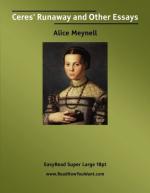The thing we should lament is rather that the world which refused, neglected, forgot him—and by chance-medley was right, was right!—had no possible authority for anything that it did against him, and that he might have sent it to school, for all his defect of genius; moreover, that he was mortally wounded in the last of his forty years of battle by this ironic wound: among the bad painters chosen to adorn the Houses of Parliament with fresco, he was not one. This affront he took at the hands of men who had no real distinctions in their gift. He might well have had, by mere chance, some great companion with whom to share that rejection. The unfortunate man had no such fortuitous fellowship at hand. How strange, the solitude of the bad painter outcast by the worst, and capable of making common cause indomitably with the good, had there been any such to take heart from his high courage!
There was none. There were ranged the unjust judges with their blunders all in good order, and their ignorance new dressed, and there was no artist to destroy except only this one, somewhat better than their favoured, their appointed painters in fresco; one uncompanioned, and a man besides through whose heart the public reproach was able to cut keenly.
Is this sensibility to be made a reproach to Haydon? It has always seemed to me that he was not without greatness—yet he was always without dignity—in those most cruel passages of his life, such as that of his defeat, towards the close of his war, by the show of a dwarf, to which all London thronged, led by Royal example, while the exhibition of his picture was deserted. He was not betrayed by anger at this end of hopes and labours in which all that a man lives for had been pledged. Nay, he succeeded in bearing what a more inward man would have taken more hardly. He was able to say in his loud voice, in reproach to the world, what another would have barred within: one of his great pictures was in a cellar, another in an attic, another at the pawnbroker’s, another in a grocer’s shop, another unfinished in his studio; the bills for frames and colours and the rent were unpaid. Some solace he even found in stating a few of these facts, in French, to a French official or diplomatic visitor to London, interested in the condition of the arts. Well, who shall live without support? A man finds it where he can.




